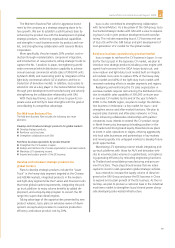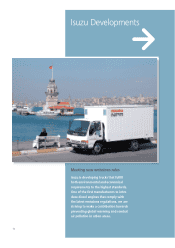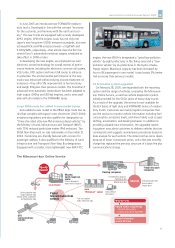Isuzu 2005 Annual Report Download - page 18
Download and view the complete annual report
Please find page 18 of the 2005 Isuzu annual report below. You can navigate through the pages in the report by either clicking on the pages listed below, or by using the keyword search tool below to find specific information within the annual report.
19
«
Isuzu Motors Limited Annual Report 2005
tion of interest-bearing debt, whose balance stood at ¥393,103 million (exclud-
ing convertible bonds) at the end of fiscal 2005—¥53,561 million less than a
year earlier. This is still a relatively large balance, however, leaving us vulnerable
to the risk of higher interest payments having a negative impact on earnings
and financial position of the Isuzu group should market rates rise sharply.
3. Foreign exchange fluctuations
The business of the Isuzu group includes manufacturing and marketing
products in several regions around the world. Local currency amounts for sales,
expenses, assets and other items are therefore converted into Japanese yen in
the preparation of our consolidated financial statements. Depending on the
exchange rate in effect at the time of conversion, the yen amount for these
items may change even if the underlying local currency value has not changed.
Generally, a strengthening of the yen relative to other currencies has a negative
impact on the business of the Isuzu group, and a weakening of the yen has a
positive impact.
4. Dependence on General Motors Corporation and other major
customers
The Isuzu group supplies vehicles and vehicle components to General Motors
Corporation (Detroit, MI) and its affiliates as well as to other vehicle manufac-
turers on an OEM basis. Sales to these customers are affected by fluctuations in
production and sales at these customer companies and other factors over which
the Isuzu group has no control, and therefore they could have a negative effect
on the earnings and financial position of the Isuzu group.
5. Suppliers, subcontractors, etc., of parts and materials
The Isuzu group sources the raw materials, components, and products re-
quired for production from outside suppliers. Should supply-demand condi-
tions significantly exceed suppliers’ capacity, it is possible that we are unable to
source sufficient volume. Shortages of, and delays in the supply of parts, etc.,
could have a negative impact on the earnings and financial position of the Isuzu
group.
6. Product defects
At its plants both inside and outside of Japan, the Isuzu group manufactures
its products according to the strictest globally accepted quality control stan-
dards. However, in the unusual event of a large-scale recall or product liability
award, there could be a negative impact on the earnings and financial position
of the Isuzu group.
7. Joint ventures
The Isuzu group engages in business in some countries in the form of joint
ventures due to legal and other requirements of each country. Changes in man-
agement policy, operating environment, etc., of these joint ventures can affect
their earnings performance, which could produce a negative impact on the
earnings and financial position of the Isuzu group.
8. Disasters, power outages, and other interruptions
To minimize the potential of a negative impact due to an interruption in the
manufacturing process, the Isuzu group regularly conducts disaster prevention
inspections and facilities examinations at all of our sites. However, we may not
be able to completely eliminate or minimize the impact that would arise from a
disaster, power outage, or other interruption during the manufacturing process.
9. Securities investments
The Isuzu group invests in securities to produce, sell, and distribute its prod-
ucts as well as to build and maintain good relationships with its business part-
ners. For marketable securities, a downturn in share prices could have a negative
impact on the earnings and financial position of the Isuzu group. Isuzu provides
management guidance and advice to companies—including those in which we
have invested through non-marketable securities—that can have a strong influ-
ence over our own business results. However, if the financial condition of the
companies in which we have invested were to deteriorate due to factors such
as a worsening business environment, this could have a negative impact on the
earnings and financial position of the Isuzu group.
10. Retirement obligations and deferred tax assets
The figures recorded for “retirement obligations” and “deferred tax assets”
are estimates that reflect the judgment of management. Because of the uncer-
tain nature of estimates, in some cases actual results may vary from initial esti-
mates, and this could have a negative impact on earnings results.
11. Potential risks associated with international activities and foreign
ventures
The Isuzu group conducts some of its manufacturing and marketing activi-
ties outside of Japan—in the U.S. and in developing and emerging markets in
Asia. The following risks are inherent to such overseas business development,
and could have a negative impact on the earnings and financial position of the
Isuzu group.
• Unfavorable changes in the political or business climate
• Difficulties in recruiting and retaining personnel
• Inadequate technological infrastructure could have a negative impact on
our manufacturing activities or on our customers’ support of our prod-
ucts and services.
• Potential negative tax consequences
• Social unrest stemming from terrorism, war or other factors.
12. Limits on intellectual property protection
The Isuzu group has accumulated technology and expertise that differenti-
ates us from our rivals; however, in certain regions due to legal restrictions we
are unable to fully protect or we are able to only partly protect some of our pro-
prietary technology and expertise through intellectual property rights. As a re-
sult, we may be unable to effectively prevent third parties from using our intel-
lectual property to make similar products.
13. Legal requirements
The Isuzu group is subject to various government regulations in the countries
in which it does business, such as business and investment approvals, export
controls designed to protect national security, and other import/export regula-
tions such as tariff rules. We are also subject to legal requirements concerning
areas such as commerce, antitrust, patents, consumer rights, taxation, foreign
exchange, recycling and safety. Unexpected changes in these regulations could
have a negative impact on the earnings and financial position of the Isuzu
group. Exhaust emissions regulations are generally being tightened amid grow-
ing environmental awareness. Since substantial investment is required to comply
with these regulations, failure to generate sufficient sales to recover this invest-
ment could have a negative impact on the earnings and financial position of the
Isuzu group.
14. Impairment accounting
The Isuzu group owns and leases facilities used in manufacturing, marketing
and distributing our products. Japan is preparing to introduce impairment ac-
counting for fixed assets used in the course of business, and if it becomes nec-
essary to treat some fixed assets that are owned or used through finance leases
as impaired, this could have a negative impact on the earnings and financial po-
sition of the Isuzu group.
15. Sale of Kawasaki Plant property
We have been notified of a claim for damages stemming from soil contami-
nation of natural origin at a parcel of property at our Kawasaki plant location,
which we sold in July 2001 to the Urban Renaissance Agency, an independent
administrative institution. Depending on the course of this claim, this could have
a negative impact on the earnings and financial position of the Isuzu group.
16. Preferred shares
Isuzu issued preferred shares on December 26, 2002. These shares could be
exchanged for common shares at some time in the future, and this could result
in the dilution of the existing common shares.
























